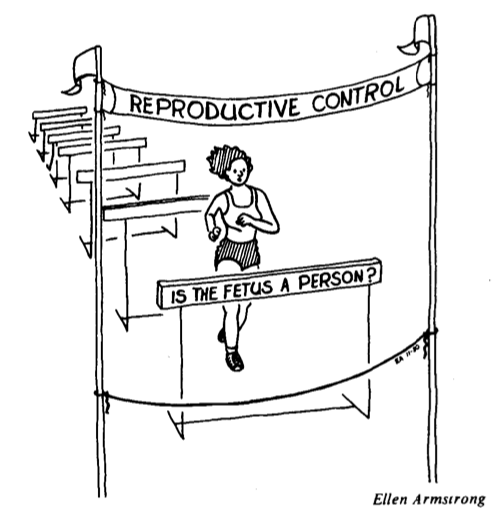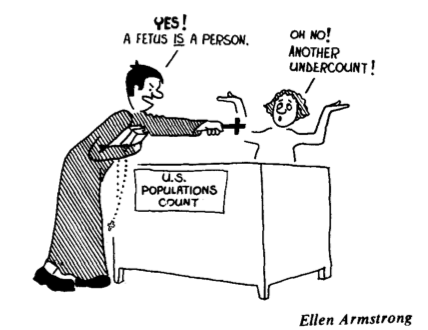This essay is reproduced here as it appeared in the print edition of the original Science for the People magazine. These web-formatted archives are preserved complete with typographical errors and available for reference and educational and activist use. Scanned PDFs of the back issues can be browsed by headline at the website for the 2014 SftP conference held at UMass-Amherst. For more information or to support the project, email sftp.publishing@gmail.com
Abortion Controversy: Is A Fetus A Person?
by Carol Donovan
‘Science for the People’ Vol. 12, No. 6, November-December 1980, p. 9-11
Carol Donovan is a member of the New American Movement, and she is active in the women’s movement in New Haven, Connecticut.
The Experts on Abortion
From a sociological and political point of view, the history of western science has been the history of the gradual replacement of religious sources of knowledge and power by scientific ones. The substitution of scientist for priest has had beneficial consequences: some diseases, at least, respond more favorably to medicines than to the casting of spells. The rise of the scientific expert, on the other hand, has also had somewhat less visible and less salutary consequences. In many of the arenas where religious figures, drawing on divine inspiration, once advised us how we ought to live, the scientific expert, relying on an understanding of the inner workings of things, now often prescribes the “scientific” solution to essentially political and moral problems. Scientific treatment of disease may be progress. Scientists’ answers to socio-political problems on occasion threaten to return us to the dark ages.
The abortion controversy illustrates the folly and the danger of removing religious elites from the position of authority only to replace them with scientific ones. A central question in the abortion controversy is the status of the fetus. Some abortion rights opponents turn to religious authorities, who answer that the fetus is a person. They rely on this apparent fact to argue that a fetus has a right to life equal to that of a pregnant woman. However, the authority of religions, when it comes to facts, has been substantially eroded, particularly when religions disagree, as they do on whether the fetus is a person. The scientific expert is increasingly drawn in to bolster the case for the personhood of the fetus. In the context of our cult of the expert, a doctor’s or a biologist’s claim that a fetus is a person is accorded special weight. For those skeptical of clerics, the wisdom of the scientist is substituted. This tactic is also used by some advocates of choice, who counter with their own expert scientists’ assertions that fetuses are not persons.

A Moral Not a Scientific Question
This battle of the experts obscures a critical point. Whether a fetus is or is not a person is a moral and not a scientific question. Determining whether a fetus is a person is not like determining whether a newly-discovered plant is edible or inedible. It is instead like determining whether it is morally acceptable to remove the plant from land belonging to the people who inhabit it. There is no fact to be discovered about the personhood of fetuses. What could possibly constitute such a discovery?
Knowing all of the facts about fetuses would not be sufficient to answer this question. To determine that something is a person is by definition to confer on it certian rights, and to create for other people certain obligations with respect to it. To decide whether fetuses are to count as people is to make a moral decision. To accord special weight to “expert” opinion on this question, as we do on the question of fact, is to misconstrue the question.
Deciding the Moral Question
How do we decide this moral question for ourselves? How, indeed, do we ever decide a moral question? Generally, we proceed by considering the consequences of answering the question. If removing a plant from the land where it grows provides those who remove it with a pleasant and exotic supplement to their already adequate diet, but leads to malnutrition for the inhabitants of that land, we would conclude that it is immoral to remove it. The negative consequences outweigh the benefits of removal. Similarly, we must consider the consequences of deciding to count the fetus as a person and compare them to the consequences of deciding not to count the fetus as a person. We then make a moral judgement as to the relative desirability of the consequences.

If fetuses are counted as persons, abortion is killing a person. Since killing persons can be allowed only in extraordinary circumstances, abortion could seldom be a moral choice. By counting the fetus as a person, society is burdening women who have unwanted pregnancies. Not only are their bodies occupied and used against their will for nine months, their prospects for a good life beyond this nine month period are substantially impaired. Women who do not want a child are often economically and psychologically unable to properly care for that child. Their decisions about whether to continue their education, what kind of work they will pursue, where and with whom they will live may be crucially affected.
Consequences of Abortion Decisions
The implications of counting fetuses as persons are not limited to women with unwanted pregnancies although the consequences for them are of first importance. Feminist social scientists have noted that throughout history women have been at the mercy of our reproductive systems.1 This has been closely related to the secondary status of women socially, politically and economically. If women have little control over when they have children, or whether they have them or how many they have, their lives will be severely restricted. Women will have difficulty establishing themselves on an equal footing with men as long as they lack control over the central events of their lives, and as long as there is a socail presumption that they lack this control. Since there are no safe and effective contraceptives, abortion is essential as a backup solution when an unwanted pregnancy occurs. The consequences of deciding whether or not women’s reproduction is under their control have an important bearing on the larger social context which affects everyone, not just women with unwanted pregnancies.
In weighing the consequences of deciding the status of the fetus, we must take account of the considerations on the other side. Yet, fetuses indisputably are capable of becoming persons. Insofar as we accord such high value to persons, we ought to respect that potential. Reverence for human life, it is argued, must extend to treating fetuses as full-fledged persons from the moment of conception. If no one were to be substantially harmed by such a decision, we would find this argument compelling. Its fatal flaw is demonstrated by the following analogy.
Suppose members of a certain society notice that certain mammals which they are accustomed to killing for food are in many respects like persons. There are after all, striking similarities. Suppose a concerned person suggests that these mammals ought to be counted as persons. One way of reinforcing their reverance for human life is to treat things which are very much like them as persons. People should no longer be permitted to eat them. In certain situations this argument has something to recommend it. Suppose, however, that if this society were to prohibit killing these mammals, a certain portion of the population would suffer severe protein deficiencies. The resulting inevitable burden on individuals who clearly are persons must be taken into account. This society can be generous in what it considers as a person, only if it sacrifices some substantial interests of individuals who clearly are persons. By analogy, to decide that a fetus is a person is to sacrifice the substantial interests of some people in the absence of sufficient reasons for doing so.
Women Must Have the Right to Choose
To count fetuses as persons is grossly unfair to women. It creates a moral climate in which a segment of the population which has been historically oppressed is required to bear an extraordinary burden for the sake of what is no more than a verbal relic, in a society which practices capital punishment, glorifies militarism and minimizes the value of persons in a thousand other ways. A weighing of the consequences of counting fetuses as persons is a balancing of the most fundamental concrete interests of women against an abstract principle of ambiguous meaning and rare application in this society. We cannot reasonably sacrifice the people for the principle.
Once the question of whether a fetus is a person is correctly perceived to be a moral question, we can see what sorts of considerations should guide us in our decision. By considering the status of the fetus as a question of fact and referring it to experts, the abortion controversy is distorted. We overlook or underestimate the factors which should be decisive in resolving the question. The Supreme Court, in its 1973 decision that pregnant women have a fundamental constitutional right to choose abortion (Roe v. Wade), was forced to give little weight to the opinions of religious, philosophical and medical experts on whether the fetus is a person since they largely disagreed. Rather than insisting that our “experts” on fetuses prevail, abortion rights advocates must educate themselves and others as to where the real issues lie.
The recent cutting back on the right to abortion in the legislatures and in the courts must be seen for what it is. It is not the product of disagreement amongst authorities as to a matter of fact. It is a discounting of the rights of women. These cut-backs must be fought with the intensity that comes from an appreciation of their true significance.

